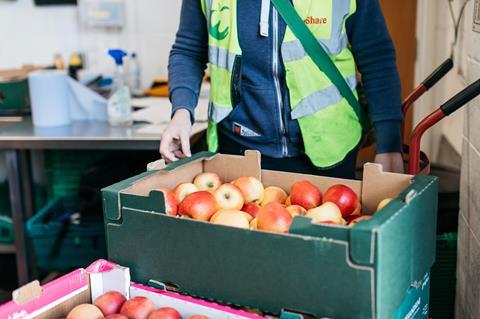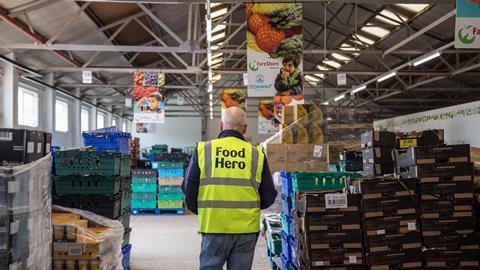Fred Searle speaks to FareShare’s Emma Brown about the state of UK food redistribution and how more fresh produce suppliers can get involved
How many fresh produce suppliers do you work with in the UK?
FareShare operates on a national scale, with a network of 35 warehouses across the country. We currently work with around 70 fresh produce partners. They range from large produce companies working with retailers, foodservice and wholesale, to medium and smaller growers. We are hugely grateful to all our partners, as without them we wouldn’t be able to continue our vital work getting more surplus food to people and communities in need.
How much have fresh produce donations risen in recent years?
Between 2020 and 2023, the volume of fresh produce we received grew by 40 per cent. The produce industry has become increasingly engaged with our mission and the number of partners is growing.
In 2019, we received funding to launch the ‘Surplus With Purpose’ fund, to help us access more surplus food from farms. The scheme works with businesses across the industry to help cover the extra costs of redistributing their unsold food to people who need it.
The government funding was a game-changer, but sadly it was discontinued, and we now rely on the generosity of donors and the public to help support the scheme through fundraising. Our recently launched manifesto sets out how the new government can support the food redistribution sector, to help get more food to people, rather than letting it go to waste.
How do your partnerships with producers work?
When a new partner gets in touch with us, one of our specialist produce team members will respond and arrange an introductory call. We collaborate closely to make sure we understand their needs, including the most appropriate formats and collection times.
Often, we can arrange a collection the same or next day. This can be done once we have information on what the produce is, how many pallets there are, remaining shelf life, and confirmation that the collection will have no more than 20 per cent rots and moulds by the time it reaches us.
We are also currently running a grading trial in one of our depots so we can accept and sort produce with up to 35 per cent rots and moulds. This has allowed us to redistribute around 60 tonnes of additional fresh produce in the last few months.
We have plenty of capacity for more produce and can take most formats, plus we have retailer authorisation to redistribute products in retail packaging.
What has FareShare done to make the process easier for suppliers?
Our specialist produce team do all they can to make the process of sending surplus to FareShare as easy as possible. We work with most major retailers to allow own-label authorisations; can help with pallet and tray de-hire schemes; allow 20 per cent tolerance for rots and moulds; and can offer funding through ‘Surplus With Purpose’.
We can accept produce in various formats, including bulk, as our network means we can distribute produce widely.
We are always looking for new and innovative ways to make the process even smoother and welcome feedback from suppliers.
What are the benefits of working with FareShare for suppliers?
Working with FareShare enables suppliers to feel confident that the nutritious food they work hard to produce will go to people rather than to waste. They are contributing to a significant social and environmental impact, while avoiding waste costs and helping to meet net-zero targets.
Suppliers also benefit from working with FareShare in other ways. Many tell us that staff engagement is important, and they appreciate the opportunities for volunteering at our regional sites across the UK.
Are you looking for new supply relationships in any particular fresh produce categories?
Absolutely. Charities and groups that receive food from FareShare use fresh fruit in a variety of ways. Handheld fruit and vegetables can be used by schools, breakfast clubs and other charities that support families with children.
Fresh produce, more generally, is included in nourishing meals to feed older people struggling with loneliness, or hot dinners for people experiencing homelessness. It is also used in cookery classes by groups supporting young people, in refuges, and in hostels.
We always need more of most produce types, particularly fruit, and are keen to speak to producers who don’t already work with us about unlocking their surplus.
A recent YouGov survey found that a third of families are buying less fruit than they were a year ago due to the cost-of-living crisis. By enabling charities to provide fruit, our partners are making a huge difference in supporting people to access healthier diets.
What needs to be done to redistribute more surplus produce in Britain and reach more people?
Demand for food support is higher that it has ever been. We currently have around 1,500 charities on our waiting lists. If the produce industry can pull together to continue to support FareShare, we could create an even bigger impact. We have a lot more capacity to take produce, particularly thanks to initiatives like the Coronation Food Project, which launched last year.
FareShare’s recently launched manifesto, ‘Where’s the Food? Strengthening Communities Through Surplus Food Redistribution’, calls on the new government to make it easier for businesses to donate surplus food. Among many recommendations, the manifesto calls for subsidies for farmers to cover redistribution costs; tax benefits for businesses donating surplus food; sustained funding for farm-level food redistribution; and mandatory food waste reporting.
Long term, FareShare’s vision is for a healthier, more sustainable, and more equitable UK in which food waste is significantly reduced, and vulnerable communities are better supported.
For more information on working with FareShare, visit fareshare.org.uk/giving-food or email emma.brown@fareshare.org.uk.

Fighting food waste with Fresca
Nikki Churchill, Fresca
When did you start working with FareShare and how much surplus produce have you donated?
Fresca businesses have been working with FareShare since 2013. To date, we have donated 8.7 million meals.
What benefits has it brought your business?
Since Fresca is a grower here in the UK, as well as a global importer, surplus is inevitable at times. We may have high yields of crops that don’t have a commercial outlet, receive imports that don’t have sufficient life to go through the retail supply chain, or find ourselves with produce that isn’t to a saleable standard (wonky or with blemishes etc). Knowing that we can redirect what is still extremely nutritious food through FareShare ensures produce still has a valuable purpose.
FareShare colleagues have also visited our sites and conducted ‘waste-walks’ with us. These have been extremely informative as they’ve highlighted different opportunities to save food – for example by using shelf-life samples, vegetable peelings etc.
What would your advice be to other fresh produce suppliers considering working with FareShare?
As FareShare deal with literally thousands of charitable organisations, they can manage large quantities of a single product by sharing bulk collections across their network of hubs, and also by finding creative ways to utilise the products.
Go and visit one of the FareShare hubs – see how they operate, learn some less obvious ways that your organisation can help the cause, and meet the teams and the brigade of volunteers. Nothing is too much trouble. Their enthusiasm is palpable.




